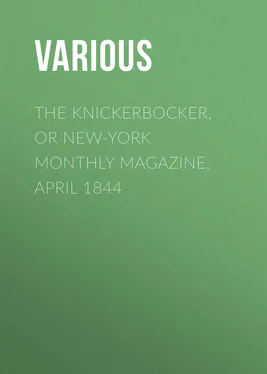Various - The Knickerbocker, or New-York Monthly Magazine, April 1844
Здесь есть возможность читать онлайн «Various - The Knickerbocker, or New-York Monthly Magazine, April 1844» — ознакомительный отрывок электронной книги совершенно бесплатно, а после прочтения отрывка купить полную версию. В некоторых случаях можно слушать аудио, скачать через торрент в формате fb2 и присутствует краткое содержание. Жанр: foreign_antique, periodic, foreign_edu, на английском языке. Описание произведения, (предисловие) а так же отзывы посетителей доступны на портале библиотеки ЛибКат.
- Название:The Knickerbocker, or New-York Monthly Magazine, April 1844
- Автор:
- Жанр:
- Год:неизвестен
- ISBN:нет данных
- Рейтинг книги:4 / 5. Голосов: 1
-
Избранное:Добавить в избранное
- Отзывы:
-
Ваша оценка:
- 80
- 1
- 2
- 3
- 4
- 5
The Knickerbocker, or New-York Monthly Magazine, April 1844: краткое содержание, описание и аннотация
Предлагаем к чтению аннотацию, описание, краткое содержание или предисловие (зависит от того, что написал сам автор книги «The Knickerbocker, or New-York Monthly Magazine, April 1844»). Если вы не нашли необходимую информацию о книге — напишите в комментариях, мы постараемся отыскать её.
The Knickerbocker, or New-York Monthly Magazine, April 1844 — читать онлайн ознакомительный отрывок
Ниже представлен текст книги, разбитый по страницам. Система сохранения места последней прочитанной страницы, позволяет с удобством читать онлайн бесплатно книгу «The Knickerbocker, or New-York Monthly Magazine, April 1844», без необходимости каждый раз заново искать на чём Вы остановились. Поставьте закладку, и сможете в любой момент перейти на страницу, на которой закончили чтение.
Интервал:
Закладка:
Rooms provided with chimnies are noticed as a luxury by the author of Pierce Ploughman. ‘Now,’ says an author still more recent, ‘have we many chimnies, and yet our tenderlings complain of rheums, catarrhs and poses, (colds in the head.) Then had we none but rere dosses , (plates of iron or a coating of brick to enable the wall to resist the flame,) and our heads did never ache. For as the smoke in those days was supposed to be a sufficient hardening for the timber of the house, so it was reputed a far better medicine to keep the good man and his family from the quacke, (ague,) or pose, wherewith, as then, very few were oft acquainted.’
Harrison’s Description of England prefixed to Holinshed.IDYLL
IN IMITATION OF THEOCRITUS, BY WILLIAM CHIDDON
Thou wanderer where the wild wood ceaseless breathes
The sweetly-murmuring strain, from falling rills
Or soft autumnal gales; O! seek thou there
Some fountain gurgling from the rifted rock,
Of pure translucent wave, whose margent green
Is loved by gentlest nymphs, and all the train
Of that chaste goddess of the silver bow;
For silent, shady groves, by purling springs,
Delight the train, and through the gliding hours
Their nimble feet in mazy trances wind;
And oft at eve, the wondering swain hath heard
The Arcadian pipe and breathing minstrelsy,
From joyous troops of those rude deities
Whose homes are on the steep and rocky mount,
Or by the silver wave in woody dell,
And know the shrine, with flowery myrtles veiled,
All lonely placed by that wild mountain stream,
That from the sacred hills, like Hippocrene,
With warbling numbers, softly glides along.
Kneel humbly there, and at the auspicious time,
Invoke the listening spirit to my aid,
That I may fly the nymph of shapely form,
Whose fragrant brow inwoven wreaths adorn,
Of blushing rose and ivy tendrils green.
Then swear for me to deck the favoring shrine
With flowrets, blooming from the lap of Spring,
And on the sculptured pile, with solemn vow,
The tender kid devote in sacrifice.
So may my heaving bosom rest serene,
Nor winged spells incite the soul again
To love the soft eyed maid Zenophyle.
THE LEGEND OF DON RODERICK
NUMBER TWO
The course of our legendary narration now returns to notice the fortunes of Count Julian, after his departure from Toledo, to resume his government on the coast of Barbary. He left the Countess Frandina at Algeziras, his paternal domain, for the province under his command was threatened with invasion. In fact, when he arrived at Ceuta he found his post in imminent danger from the all-conquering Moslems. The Arabs of the East, the followers of Mahomet, having subjugated several of the most potent oriental kingdoms, had established their seat of empire at Damascus, where, at this time, it was filled by Waled Almanzor, surnamed ‘the Sword of God.’ From thence the tide of Moslem conquest had rolled on to the shores of the Atlantic; so that all Almagreb, or Western Africa, had submitted to the standard of the prophet, with the exception of a portion of Tingitania, lying along the straits; being the province held by the Goths of Spain, and commanded by Count Julian. The Arab invaders were a hundred thousand strong, most of them veteran troops, seasoned in warfare and accustomed to victory. They were led by an old Arab general, Muza ben Nosier, to whom was confided the government of Almagreb; most of which he had himself conquered. The ambition of this veteran was to make the Moslem conquest complete, by expelling the Christians from the African shores; with this view his troops menaced the few remaining Gothic fortresses of Tingitania, while he himself sat down in person before the walls of Ceuta. The Arab chieftain had been rendered confident by continual success, and thought nothing could resist his arms and the sacred standard of the prophet. Impatient of the tedious delays of a siege, he led his troops boldly against the rock-built towers of Ceuta, and attempted to take the place by storm. The onset was fierce, and the struggle desperate: the swarthy sons of the desert were light and vigorous, and of fiery spirits; but the Goths, inured to danger on this frontier, retained the stubborn valor of their race, so impaired among their brethren in Spain. They were commanded, too, by one skilled in warfare and ambitious of renown. After a vehement conflict, the Moslem assailants were repulsed from all points, and driven from the walls. Don Julian sallied forth, and harassed them in their retreat; and so severe was the carnage, that the veteran Musa was fain to break up his camp, and retire confounded from the siege.
The victory at Ceuta resounded throughout Tingitania, and spread universal joy. On every side were heard shouts of exultation mingled with praises of Count Julian. He was hailed by the people, wherever he went, as their deliverer, and blessings were invoked upon his head. The heart of Count Julian was lifted up, and his spirit swelled within him; but it was with noble and virtuous pride, for he was conscious of having merited the blessings of his country.
In the midst of his exultation, and while the rejoicings of the people were yet sounding in his ears, the page arrived who bore the letter from his unfortunate daughter.
‘What tidings from the king?’ said the count, as the page knelt before him: ‘None, my lord,’ replied the youth, ‘but I bear a letter sent in all haste by the Lady Florinda.’
He took the letter from his bosom and presented it to his lord. As Count Julian read it, his countenance darkened and fell. ‘This,’ said he, bitterly, ‘is my reward for serving a tyrant; and these are the honors heaped on me by my country, while fighting its battles in a foreign land. May evil overtake me, and infamy rest upon my name, if I cease until I have full measure of revenge.’
Count Julian was vehement in his passions, and took no counsel in his wrath. His spirit was haughty in the extreme, but destitute of true magnanimity, and when once wounded turned to gall and venom. A dark and malignant hatred entered into his soul, not only against Don Roderick, but against all Spain: he looked upon it as the scene of his disgrace, a land in which his family was dishonored: and, in seeking to avenge the wrongs he had suffered from his sovereign, he meditated against his native country one of the blackest schemes of treason that ever entered into the human heart.
The plan of Count Julian was to hurl King Roderick from his throne, and to deliver all Spain into the hands of the infidels. In concerting and executing this treacherous plot, it seemed as if his whole nature was changed; every lofty and generous sentiment was stifled, and he stooped to the meanest dissimulation. His first object was to extricate his family from the power of the king, and to remove it from Spain before his treason should be known; his next, to deprive the country of its remaining means of defence against an invader.
With these dark purposes at heart, but with an open and serene countenance, he crossed to Spain, and repaired to the court at Toledo. Wherever he came he was hailed with acclamations as a victorious general, and appeared in the presence of his sovereign radiant with the victory at Ceuta. Concealing from King Roderick his knowledge of the outrage upon his house, he professed nothing but the most devoted loyalty and affection.
The king loaded him with favors; seeking to appease his own conscience by heaping honors upon the father in atonement of the deadly wrong inflicted upon his child. He regarded Count Julian, also, as a man able and experienced in warfare, and took his advice in all matters relating to the military affairs of the kingdom. The count magnified the dangers that threatened the frontier under his command, and prevailed upon the king to send thither the best horses and arms remaining from the time of Witiza, there being no need of them in the centre of Spain in its present tranquil state. The residue, at his suggestion, was stationed on the frontiers of Gallia; so that the kingdom was left almost wholly without defence against any sudden irruption from the south.
Читать дальшеИнтервал:
Закладка:
Похожие книги на «The Knickerbocker, or New-York Monthly Magazine, April 1844»
Представляем Вашему вниманию похожие книги на «The Knickerbocker, or New-York Monthly Magazine, April 1844» списком для выбора. Мы отобрали схожую по названию и смыслу литературу в надежде предоставить читателям больше вариантов отыскать новые, интересные, ещё непрочитанные произведения.
Обсуждение, отзывы о книге «The Knickerbocker, or New-York Monthly Magazine, April 1844» и просто собственные мнения читателей. Оставьте ваши комментарии, напишите, что Вы думаете о произведении, его смысле или главных героях. Укажите что конкретно понравилось, а что нет, и почему Вы так считаете.












